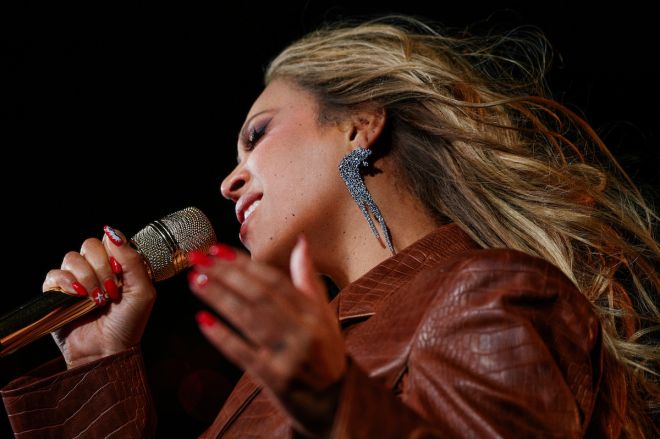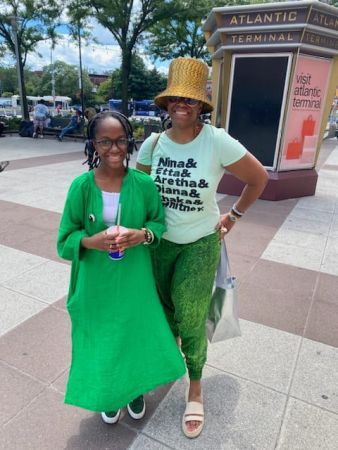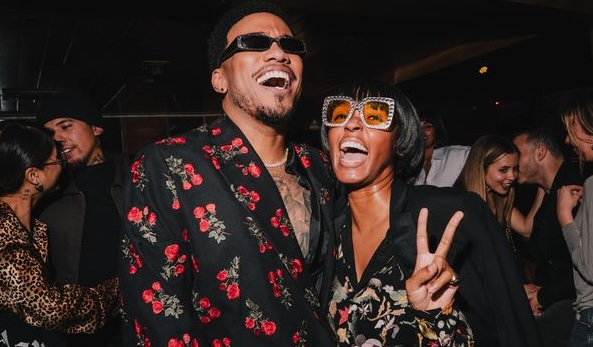With 'Cowboy Carter,' A Daughter Reclaims Her Musical Inheritance
What Beyoncé And The ‘Cowboy Carter’ Tour Taught Me—And My Daughter—About Fear, Power And Being Seen [Op-Ed]
Share the post
Share this link via
Or copy link

Beyoncé is an overachiever.
She literally does the most: she writes, sings, arranges, directs, produces, and executive produces. She envisions. She takes up space, and she outworks everybody. In peak Virgo fashion, she is addicted to excellence. I do not, however, ascribe the often overly thrown about descriptor of “fearless” to her. Perhaps an unpopular opinion, but I think calling women “fearless” is akin to calling them “Superwoman.” The label prevents us from conquering fears we actually have; it promotes suppressing the prohibitive or subtractive parts of us that we ought to confront and dismantle. Is she unafraid? Absolutely–but as otherworldly as she is, she makes the case with each new body of work that she is human. Beyoncé isn’t fearless. Nah. Unlike the fear that most of us carry, hers doesn’t rest in the realm of doing. I believe that for her, it lives in not going after what has yet to be done.
She’s been pushing past limits since she hit the double digits; she’s default set on uncomfortable. If I had to guess when, I’d wager that she evicted fears of success and fears of failure back when she secretly recorded B’Day in three weeks at Sony Studios. As the inventor of the visual album and the surprise digital drop, she matriculated from veteran to titan of the music business.
For two of her three decades in the game, she’s added the roles of wife and mother. At one time, there was doubt as to whether a woman in music could be King. Lemonade and the Formation World Tour changed that: Beyoncé assumed her rightful place as the undisputed inheritor of the crown as the world’s greatest living entertainer. When I covered that tour, I called her “King Bey.” The moniker custom fit, and she worked it into “Cozy,” her intoxicating hit from Renaissance: Act I.
Love MadameNoire? Get more! Join the MadameNoire Newsletter
We care about your data. See our privacy policy.
With 35 Grammy wins out of a staggering, record-breaking 99 nominations, career-defining Super Bowl and Coachella performances, two acclaimed concert documentaries, a Peabody Award and nothing left to prove, all there is left to do…is whatever she damn well pleases.
With Cowboy Carter, she’s here to get everything she came for: namely, her place in the continuum of country music on the shoulders of its oft-ignored and exploited Black pioneers. This album is a reclamation of the genre that is her birthright; its controversial success reclaims the genre on behalf of trailblazing women like Linda Martell, the first Black woman to take the Grand Ole Opry stage.
RELATED CONTENT: Beyoncé’s Delivers Stunning ‘Cowboy Carter’ Netflix Halftime Show — 14 Hilarious Social Media Reactions
Understanding the history Beyoncé sought to both uncover and make with Cowboy Carter, I knew exactly with whom I wanted to experience the show: my 14-going-on-41-year-old daughter, Umi. Not only was the timing right because she was old enough to attend, but she plays electric bass, loves music, math, and books, and confided in me that she really liked Beyoncé’s latest album. When I saw that Blue Ivy Carter was returning and being joined by her little sister Rumi, I felt a unique mother-daughter concertgoing experience brewing: the opportunity to see Beyoncé with new eyes.
Brimming with anticipation, we entered MetLife Stadium for Night 2. We were greeted by a massive LED wall of the American flag. As the harmonies of “Ameriican Requiem” swelled, Umi’s face lit up. She was in awe of where she stood: seeing and hearing an icon in real time. She was so awestruck that she didn’t have the knee-jerk Gen Z reaction to start capturing on her phone right away. The moment had indeed captured her.

We were 80,000 deep. Away we all went to the ho-down: a red, white, and blue-themed homage to painful history danced and sung into revelry. Undulating and fire cracking for three hours, this setlist was the most full-bodied of her tours to date, including Renaissance. While unmistakably steeped in the Black Americana of “Blackbird” and “Ya Ya,” she foreshadowed a spectacular device of blending her own catalog’s classics beneath more recent bangers when she turned the “Star Spangled Banner” into “Freedom” featuring Kendrick Lamar. Over the course of the night, “Spaghettii” would be flavored with “Flawless;” “If I Were A Boy” would meld into “Jolene,” and in a master stroke, “Sweet” from Cowboy Carter rolled like lava into Renaissance favorites “Honey” and “Summer Renaissance.” My personal favorite was a blend of “Texas Hold ‘Em” into a chopped and screwed redux of “Crazy In Love.” She then whipped us all into a frenzy with “Single Ladies (Put A Ring On It)”.
While our ‘fits ate down, MetLife wasn’t ready for this rodeo. Enthralled, we all quickly hopped on that mechanical bull for “Buckin’ and “Tyrant” as Beyoncé ran back bangers from 4 and Lemonade, pulling out “Daddy Lessons,” the receipt dated 2016 certifying that Bey been country. By the time she and her squad of dancers (tightly choreographed down to what seemed like the millisecond) were sashaying on the surface of the moon as her falsetto declared “bullshit we flying ohhhh-vaaaah,” the entire stadium seemed to be floating—Miss Umi included. I wanted to hear her perspective because while I am her mother, in many ways, she shows me new ways of understanding. Here’s part of our conversation after we had recovered from what she called a “life-changing, awesome” concert experience.
TSM: What does Beyoncé the person represent to you?
UMI: She’s multifaceted as an artist and as a person; an example of a very powerful Black woman who uses her platform to speak on real issues, so people who aren’t Black or people who aren’t women can understand through the music that she creates. Songwriting is poetry, and you can hear the poetry and the emotion in her songs.
When you say that she speaks on real issues, do you think that relates to identity—what it means to be a Black woman?
Yes, and also, what it means to be Black in America, especially during the 2020s. I relate to what she represents. I feel like in the media, Black women are said to be loud or rude or aggressive. Beyoncé doesn’t beat those stereotypes by being quiet, frilly and feminine; she embraces her loudness and acts as her true self. She’s representing all of the young Black girls who wanted to sing or were loud in class, and like to dance and show their skills.
Or want to scream, because the world is unkind to them, or doesn’t see them.
I really appreciate that about her. Sometimes, people try to combat stereotypes by becoming something else. I feel like throughout her career, Beyoncé has been wholly herself.

In her creative presentation, she delivers on countless looks, from braids and ancestral markings on her face, to big Texas hair, to the Afrofuturistic alien superstar of Renaissance, from pin-up girl to badass to veiled bride. What do you make of the way that she owns these images?
One of the things about when society puts things on you, it’s meant to be an insult. But when you take that and you reclaim it, it doesn’t hold as much power over you as it did when you didn’t have it in your arsenal. Beyoncé reclaiming stereotypical, misogynistic themes is a show of power in my opinion, because she can be all of that and still be wealthier, more intelligent, and more creative than anyone trying to oppress her.
At the show, she had a short film of home movies and pictures of her in mom mode with her babies when they were little, not glammed up, just lying on the couch with her kids. Over time, she has opted to share more of her family life. I’m just wondering: how does that occur to you?
I feel like it’s a testament to all of the Black Mothers whose work goes unseen because when you think about it, not every Black woman is filming home movies or having the time to post Facebook photos of them sitting on the couch with their kids. They’re too busy working, or they’re too busy cooking, or they’re too busy helping their kids with homework. I feel like the world deserves to see the love that a Black mother has for her children in the happy moments, how motherhood is for her.
That’s powerful: just the idea of her being able to show it and reflect it back not only to the world, but to other Black women who are mothers to say, “I see you.”
Exactly.
Right?! I hadn’t thought about it like that. I was thinking about it as her sort of rebuke of all the rumors about her.
I don’t think Beyoncé does anything for the public eye. I feel like she does it for a specific audience, and that audience is her fans. We’re all family.
So at the end of the show, when she said “I love y’all,” did you feel that connection?
Yes! I said, “I love you, Beyoncé!”
When I told you that we were going to the concert, what went through your mind?
You know that feeling when you feel like something great is about to happen? I felt like that the whole week. I was just so excited; Beyoncé is a fixture in our culture, and I feel like it’s such an honor to be able to hear her sing live.
I felt like this was finally the point at which you were old enough, and when you told me that you liked Cowboy Carter, I was like, OK—she likes the music, so this is the tour for her.

Any thoughts about what you were expecting going in?
Besides greatness? She’s unpredictable, and it keeps you on your toes. If you were to tell a Beyoncé fan 20 years ago that she would release a country album, they would probably look at you like you were crazy. I was waiting for her to give me whatever she was going to give.
What are your favorite songs off the album?
My number one is probably “Bodyguard.” I really like that song.
She said that was her favorite, too! Do you identify with any of the mother-daughter themes on the album, like “Protector” and “Daughter,” or “Buckin’” where she’s talking about traits that she gets from her mother?
I do really appreciate the perspective, because I feel like the words of Black mothers are so often ignored, and it’s just nice to think these songs might be how my mom thinks about me.
What were some of your favorite aspects of the show?
My favorite part of the show was the beginning montage of a lot of Black country singers or blues singers. It felt like being at a drive-in movie. The media so often forgets that all types of music stemmed from Black people, so it was nice for her to be like, “Hey… remember we did this, and then you took it, and then you gentrified it and changed it?” I liked seeing this concrete, historical proof of our presence in country music; yeah, this is us, we have been here. I feel like we get locked into a box of rap or trap or R&B, and that’s not all that we are.

What did you think about Rumi and Blue, who is just a year younger than you, being a part of the show?
I feel like because they know how amazing their mom is and how much of an inspiration she is to them, that they would want to be in that sphere with her, kind of like playing dress-up in the heels in the dresses. It’s kind of a bonding experience for them, and it’s also a way that Blue can enhance her skills. I can tell that she wants to continue performing. She’s good at it, too,
Is there anything else that you want to add?
I’m excited for Act III!
I replay Umi’s observations in awe of her, and am reminded of how important it is to have conversations with young people. She picked up so much more than the teenage rush of being at the concert. She saw herself, her Mom, and our relationship reflected in a new way. Her pride in being a Black girl was affirmed as natural and powerful, something to hold on to fiercely.

In one of the concert’s many decadent, bold visual installations. Beyoncé wears a pageant sash that reads, “Reclamation of America.” May we all reclaim what’s ours and stay the course, unafraid. Amen.
Thembisa S. Mshaka (@officiallipgame) is an essayist, award-winning creative, screenwriter, and author of the forthcoming second edition of Put Your Dreams First: Handle Your [entertainment] Business.
Umi Mshaka-Morris is an honor roll student, musician, and visual artist. She is the first in her family to be conferred the honor of 8th Grade Valedictorian. Umi graduates from junior high school this month.
RELATED CONTENT: Beyoncé’s ‘Cowboy Carter’ Tour Sparks Meme Madness With Rodeo Runway Looks & Family Vibes
Related Tags
Act II: Cowboy Carter beyonce Beyonce Knowles Beyonce Knowles-Carter Cowboy Carter cowboy carter tour-

She Tried It: Inahsi Naturals Aloe Hibiscus Leave-In Conditioner & Detangler
-

Meet Dominique Fils-Aimé, The Haitian-Canadian Star Redefining Jazz For A New Generation: ‘This is My Vision' [Exclusive]
-

Cooking With Purpose — How Brittney Williams Honors Her Caribbean Roots Through Food
-

8 Famous Lesbian Women Who Were Married To Men



